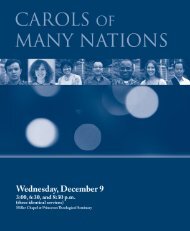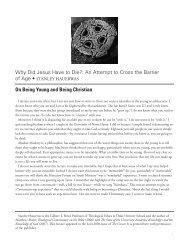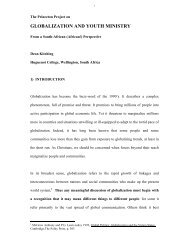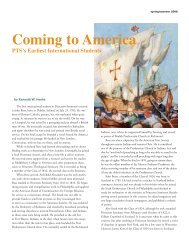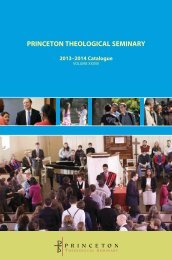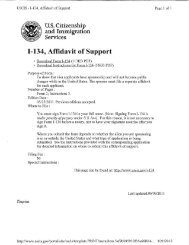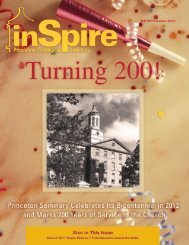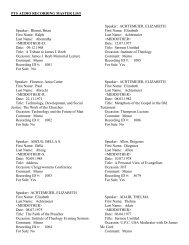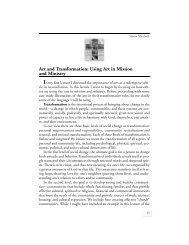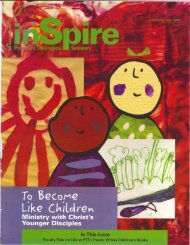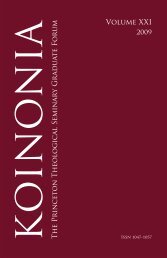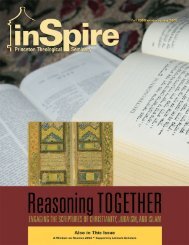P E R S P E C T I VAS - Princeton Theological Seminary
P E R S P E C T I VAS - Princeton Theological Seminary
P E R S P E C T I VAS - Princeton Theological Seminary
You also want an ePaper? Increase the reach of your titles
YUMPU automatically turns print PDFs into web optimized ePapers that Google loves.
Perspectivas/Occasional Papers • Fall 2006Perspectivas/Occasional Papers • Fall 2006bration of difference and a valuing of particularity is not a matterof political correctness or simply “identity politics.” Rather it is away of responding to centuries of equating alterity as inferiority,a means of addressing systemic injustices and unequal access bypromoting identity-based agency. Focusing on difference providesspace for personal and collective identities to emerge andassume a visible public presence in una tierra that prizes assimilation.From e pluribus unum to the Body of Christ, accommodatingdifference within community remains a concern in theconstruction of identity.A focus on difference is not without limitations. Particularity,even that, which resides on the margins, can be tempted to centrism,so much so that that there is a failure to recognize points ofintersection or to acknowledge the possibilities for commonground inherent in our human condition of multiple-belonging.Attention to relationality, for example, illuminates the reality thata number of the famous firsts and contributions we recognize duringHispanic Heritage Month in September/October also graceour celebrations of African American Heritage Month in February:Arturo Alfonso Schomburg, self described “Afroborinqueño,”curator of the largest collection of African and African Americancultural materials in the world; Eugene Marino, first AfricanAmerican Catholic Archbishop in the U.S., son of a Puerto Ricanfather; Martín de Porres, first Black saint of the Americas; bombaand mambo, and the New York Cubans of baseball’s professionalNegro Leagues—all represent a small part of intertwined inheritancesthat are sometimes missed in exclusive constructions ofdifference.Some Hispanic theologians have reflected on difference aslocus theologicus and recognized its limitations, including thedanger of reifying the very stereotypes we sought to counter.María Pilar Aquino reminds us,that any theological discourse that takes seriously intoaccount the plural fabric of reality and of knowledgemust deal also with the asymmetric character of socialpower relations at all levels. <strong>Theological</strong> discoursemust critically confront the ethnocentric tendencies ofall cultures, including its own, as well as avoid romanticizingits notions of family, community and people. 36Difference alone, whether experienced as Fernando Segovia’sbeing from two places but with no place to stand, 37 or as subsumedunder umbrella terms like Latino/a or Hispanic, inadequatelydescribes the experiences of communities and individualswhose diversity defies description. In his book from Bomba to HipHop: Puerto Rican Culture & Latino Identity, Juan Flores cautionsthat “generic, unqualified usage” of these terms can at times beemployed tomislead the public into thinking that all members andconstituents of the composite are in basically the sameposition in society and all are progressing towardacceptance and self-advancement from the same startingline, and at the same pace….Thus what presentsitself as a category of inclusion and compatibility functionsas a tool of exclusion and internal ‘othering’. 38Difference discourse further leads to exclusion when one considersthat the postmodern absolutization of particularity and othernessstill leaves the rules for engagement, the invitation togreater conversation and the framework for dialog in the hands ofthose who are considered dominant (but not necessarily constitutinga majority). These perspectives of dominance tend to seeonly the particularity of others, and not their own. By refusing toown their own difference they confuse their particularity with universality.9293



